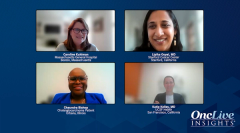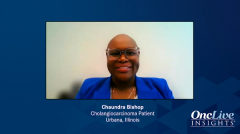
Key Takeaways For Treating Patients Diagnosed With Cholangiocarcinoma
Provider and patient perspectives on why patient education about FGFRi treatment-associated adverse events and how to manage them are is essential in helping patients maintain a good quality of life and stay on treatment.
Episodes in this series

This page is funded by Taiho Oncology, Inc. The faculty and publisher are solely responsible for this content. Taiho does not recommend or endorse the use of its products other than as described in the approved labeling. The content of this page is not medical advice and does not replace independent medical judgment.
This is a video synopsis/summary of an OncLive Insights involving Lipika Goyal, MD; Chaundra Bishop; R. Katie Kelley, MD; and Caroline Kuhlman, NP.
FGFR inhibitors such as pemigatinib and futibatinib can cause several adverse effects, including hyperphosphatemia, nail toxicities, stomatitis, and dry mouth. It is critical that patients report all adverse effects fully to their care team for optimal management. Early intervention can often control symptoms without needing treatment discontinuation. Practitioners should set expectations up front for frequent adverse effects such as nail changes, which will happen to virtually all patients to some degree. However, most adverse effects, although bothersome, are not dangerous or severe enough to require hospitalizations. The efficacy of FGFR inhibitors makes it worthwhile to perseverate through short-term quality of life impacts. Proactive strategies for adverse effect prevention and treatment allow most patients to remain on therapy long term. Ultimately, the goal is maximizing time on treatment to achieve prolonged disease control.
Video synopsis is AI-generated and reviewed by OncLive® editorial staff.





































